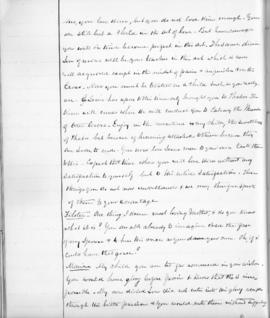DOMINIC BARBERI - ASTON HALL: "The Glory of Aston Hall" by Canon Arthur G. Wall. There are two copies, (a) a photocopy and (b) an actual copy of the booklet given to the Archives by Oliver Kelly C.P., on 10/03/1976. The preface mentions that the hall was bought in 1960 by Mr. Cyril Harty who gifted it to the Archdiocese of Birmingham for use of retired priests, of which he is one
DOMINIC BARBERI - LIFE: "Fr. Vincent McNabb, O.P.", by Ferdinand Valentine, O.P., extract from. Describes curse placed on Woodchester village, Stroud, Glos., by Dominic and of his ghostly figure seen around the church.
DOMINIC BARBERI - BEATIFICATION: Hand out for press conference, containing information on each photograph in the pack: they are as follows Dominic; Paul of the Cross; Aston Hall; first church at Stone; Newman; Littlemore; Duke of Edinburgh Hotel, Reading, (formerly Railway Tavern); Sutton; Dominic's tomb and confessional chair. Nos. 1-3 and 9 - 11 on the list were not included in the pack (see 2/1/4/5 and 2/1/4/10)
DOMINIC BARBERI - LIFE: "Vita del Servo di Dio P. Domenico della Madre di Dio, morte nell' anno 1849 in Ingleterra"..... written by Padre Filippo C.P.
DOMINIC BARBERI - MISSIONS: Extracts from the Diary of Fr. Ignatius Spencer covering week of 10/16-08-1849 showing that Dominic Barberi was in London 3 days after he said he was going there (vide 2/1/2/4-6)
Ignatius SpencerDOMINIC BARBERI - LIFE: 'Life Of The Very Rev. Father Dominic Of The Mother of God (Barberi), Passionist, Founder of the Congregation of the Passion, or Passionists, in Belgium and England' by The Rev. Pius Devine, Passionist. Publisherd by R. Washbourne, London, 1898 . This copy was presented to a Margaret Magee and is autographed by Pius.
Pius DevineDOMINIC BARBERI - LIFE: "Dominic Barberi In England A New Series of Letters" translated and edited by Father Urban Young, C.P., with an Introduction by Denis Gwynn, D.Litt., F.R.Hist.S.
DOMINIC BARBERI -LIFE: "Dominic Barberi C.P., An Apostle of England" by Osmond Thorpe, C.P., Australian Catholic Truth Society, Melbourne, 1947. This copy belonged to Frank Duff, founder of The Legion of Mary. Presented to the Archives by Fr. Herman Nolan. C.P.
DOMINIC BARBERI - BEATIFICATION: Letter from Martin Doughterty, C.P., Sutton, enclosing the information kit that will be given to the press conference on 30/09/1963 in Sutton on the occasion of the forthcoming beatification of Dominic. The enclosures were (a) a set of photographs, 19 in number but seven were not in the envelope (see 2/1/4/4-5 and 2/1/4/10); (b) notes re these photographs and (c) notes on Dominic, C.Ps. in general and the beatification
DOMINIC BARBERI - LIFE: MS notebook containing an English translation of "The Divine Paraninfa" written by Blessed Dominic but published only after his death ( In Italian. This version has not been published) There is no clue as to the translator. Alfred Wilson, C.P., in his biography, "Blessed Dominic Barberi" (see 34/1/15) in pp 165-166 writes as follows. "Significantly, all the spiritual writings of this period are predominantly mystical. The first of the predominantly mystical books was 'The Divine Paranymph', which was posthumously published in Italian and French editions. Like most of his spiritual writings it is in dialogue form, corresponding to his conception of prayer as a friendly discussion with Christ or Our Lady, in which the soul seeks understanding and reinvigoration. In this lively and extremely practical little book, Our Lady is represented as discussing the various offices of the convent with the nuns employed in them. Each office can be used as a means of attaining mystical union with God. Some very shrewd remarks are made to a deposed abbess, who fears that her assertions that she is glad to be relieved of responsibility are only humbug. The Reader's final comment on this book is significant. 'In this tract, the author not only shows himself a consuammte master of ascetics, but also gives evidence that he had been raised by God to sublime mystical contemplaton, characterized by sanity and prudence' (Pos., II. 53)"
